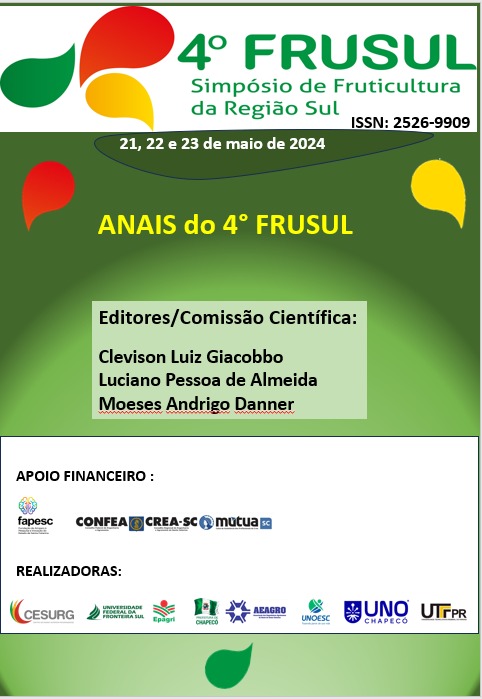Effect of a botanical and synthetic insecticide against Palpita forficifera (Lepidoptera: Crambidae) adults in laboratory
Resumo
The olive caterpillar Palpita forficifera (Lepidoptera: Crambidae) is a serious threat to olive orchards. Currently, only the synthetic insecticide Delegate® is registered for this species control in olive. The botanical insecticide Matrine® (ethanolic extract of Sophora flavescens) is recommended against mite, and its impact on P. forficifera is unknown. This work aimed to evaluate the mortality of P. forficifera adults caused by Delegate® and Matrine® in laboratory assay. The insecticides [trade name (active ingredient %) - concentration] Delegate® (spinetoram 25%) - 20g.100L-1 and Matrine® (oxymatrine 0.2%) - 300mL.100L-1 were directly sprayed in adults with a hand sprayer, in a simulated spray volume of 800L.ha-1. A control (absence of spray) was used. Five replicates were used, each one composed by four insects confined in a polyethylene terephthalate exposure arena (6 cm diameter x 8 cm high). The laboratorial conditions were 24±5oC temperature, humidity 70±10% and 14h photophase. The number of dead insects was recorded at 24h, 48h, 72h and 120h after spray, and the mortality rate was corrected according to control by Schneider Orelli’s formula. At 24h and 48h, the number of insects dead by Delegate® was significantly higher than by Matrine®. However, from 72h no significant difference was observed. At 24h and 48h after spray the mortality rate caused by Matrine® was 60% and 94.7%, respectively. Those values were significantly higher than those obtained by Matrine (15% and 63.2%). At 72h, the efficacy of Delegate® and Matrine® was similar, with 100% and 94.4% mortality, respectively. Both insecticides caused 100% mortality at 120h. Results indicate that the botanic insecticide Matrine® may be an ecofriendly and suitable option for P. forficifera management, since it can cause mortality levels similar to the synthetic insecticide Delegate®.


